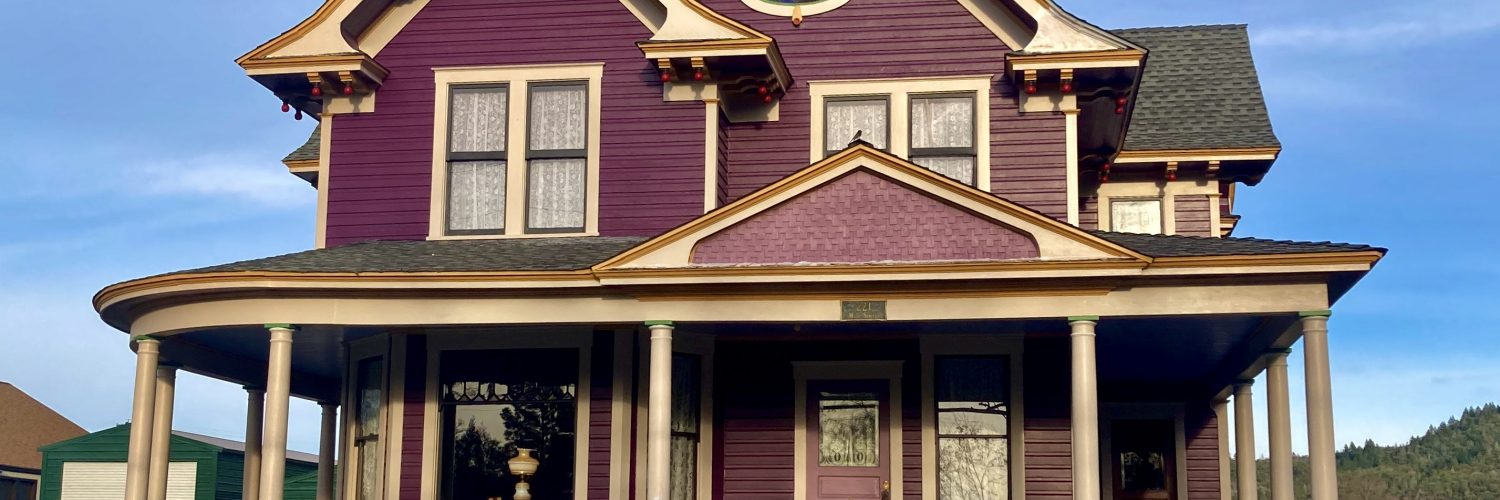
It may be a small town, but it's not always cozy
Recently I was visiting my hometown, a small community in southern Oregon that has—hard to believe since it was already so small—shrunk even further in the days since I was a child roaming the streets. (I mean that literally since very few of the roads have sidewalks, so pedestrians stroll down the unstriped asphalt as if they have an equal right to be there.)
It's a tiny town that has long boasted one gas station, no stoplights, and four churches. Sadly, the grocery store, hardware store, and drug store that were staples in my childhood are long gone. But the liquor businesses are still going strong. (Yay?)
On this particular visit, my mom and I walked into town past the gorgeous Victorian home that dates back to the town's founding in the late 19th century. It's currently undergoing a much-needed restoration, and when the pandemic loosens its grip the new owners hope to hold an open house so that members of the community can tour the interior.
I live four hours away, but I will cheerfully drive the distance to see it in person.
A block further into town is the mechanic's shop where my parents have had their cars serviced over the years. Remembering she needed to talk to the owner, my mom ducked her head into the shop.
"Hey, I've got some new wiper blades and want you to put them on."
"Great. Bring 'em on by and I'll get you taken care of."
That was it. No preamble. No giving the clerk her last name so they could look her up. No scheduling an appointment. No questions about what vehicle she was talking about. (Depending on the year, he probably sold it to her anyway.)
After a short visit about my dad's health, we turned and headed for home. Not five minutes later, as we were crossing the bridge out of town, a big bear of a man with a giant bushy gray beard pulled his cargo van over next to us. An old friend who hadn't seen my parents in years, he wanted to catch up. Right there on the bridge. Didn't matter that he was blocking traffic. The cars were few and far between and he waved them around.
The final straw was a little while later when my mom commented about the new garage door someone down the road had recently installed. As if it was big news.
The snorting laugh escaped before I could stop it, releasing a whole chain of giggles I didn't realize I'd been holding back.
All these experiences shouldn't surprise me. I grew up here. I know how insulated the small town life can feel. The safety and comfort of knowing...well, not really everyone, but enough to not lock your doors at night or insist your kids come home by dark.
It's the kind of place where not only do the school secretaries know your name and your family, but they remember you well thirty years later. A place where the lack of opportunities are compensated for by the fact that the opportunities available are open to all.
You never played football but want to give it a shot? Go for it. There's room for you on the team.
You want to be in the play but have never taken a drama class? Don't worry. You might even get the lead.
Band, student government, athletics, art, these weren't individual cliques. It was all the same kids. And often the same adults wearing different hats to fill the different needs.
It was a community.
It was home.
It was safe.
But not for all.
A couple blocks down the road from the mechanic's shop stands the house where a young girl was found murdered and buried under the foundation. She was my little sister's third grade classmate who disappeared one sunny afternoon on her way to the hardware store to buy a new bike tube. The murderer was arrested and brought to justice. As horrible as the crime was, it was a bittersweet consolation that her family found out what happened to her within days.
Not like my brother's classmate who disappeared while babysitting one night. It was ten years before her remains were discovered an hour away on property that further implicated the police's long-time suspect. He was acquitted.
A year later, her father took his own life.
What about the brutal attack that took place in the house across the street from where I grew up? Or the older couple who were shot and killed during a break-in? Or the visiting Portland man who disappeared overnight while traveling with a bike tour and was never heard from again?
That's not including the drunk driving deaths, the logging accidents, or the drug overdoses. Not to mention the domestic abuse that never makes the news.
I often wonder about this relationship between the security I felt as a child and the children who lived and died with violence. We walked the same hallways at school. We sang in the same Christmas concerts. We sat together on the splintery wooden bleachers at football games and cheered in the overheated gym during basketball. But our experiences were like distorted funhouse mirror versions of each other. What was safe and nurturing for me was threatening and dangerous for them.
I realize I can't speak for all small towns. Maybe mine is the exception. But in my experience, small towns carry an equal weight of darkness with the light. A mix of both the sentimental and the traumatic.
Occasionally I'll hear comments from someone watching a small town murder mystery television series. It usually goes something like this, "If that many murders took place in a town that size, they'd run out of people before the end of season one."
I don't say much. Clearly they haven't been to my hometown.